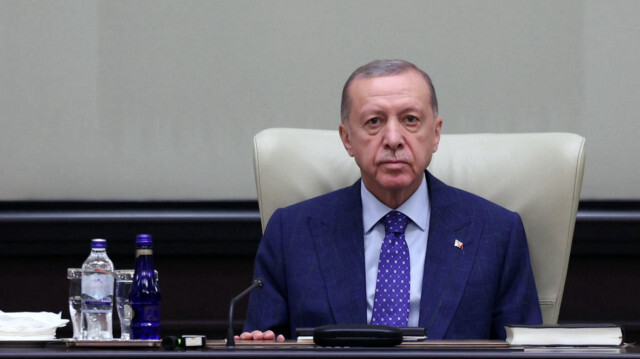
In three questions Jonathan Fenton-Harvey explains the present and future of Türkiye's relations with Gulf states under President Recep Tayyip Erdogan's government.
- How do the Arab Gulf states view President Erdogan’s victory?
After the first round of elections in Türkiye suggested that Turkish President Recep Tayyip Erdogan’s eventual victory was almost certain, Gulf leaders wasted no time in congratulating the reigning Turkish President. When Erdogan’s second-round victory was imminent, Qatari Emir Tamim bin Hamad Al Thani was the first to express his felicitations to Erdogan, underscoring Doha’s close bilateral ties with his government and its desires to strengthen their pre-existing relationship.
United Arab Emirates (UAE) President Mohammad bin Zayed also voiced his warm wishes for Erdogan's presidency and expressed his anticipation for further enhancing the strategic partnership between their countries. This interaction was telling, as it exemplifies optimism over the evolving and cooperative dynamics between the UAE and Türkiye’s relations.
Similarly, Saudi Arabia's Crown Prince Mohammed bin Salman congratulated Erdogan, while King Salman conveyed his well wishes through a congratulatory cable that also praised the relations shared by the two nations. The cable also praised the joint efforts to strengthen comprehensive cooperation between the two nations.
Prior to the election, Erdogan acknowledged the Arab Gulf states for their recent financial contributions to Türkiye’s Central Bank, although he refrained from specifying the governments involved. Similar past support from the leading Gulf states has served as a testament to the long-term confidence they have placed in Erdogan's government.
Moreover, and particularly as the president’s competitor Kemal Kilicdaroglu reportedly planned to review certain economic and security ties with the Gulf states, the status quo will likely continue and bilateral relations may even advance further.
- What has caused relations between Türkiye and the Gulf to strengthen?
In recent years, what can be considered a 'great reset' has taken place in the region. The rivalry that once pitted UAE and Saudi Arabia against Türkiye and Qatar, is now a thing of the past. Indeed, the divisions that emerged after the post-Arab Spring clashes have largely eased, with conflicts in Libya and Syria subsiding. Now, their attention is focused on new global challenges.
For instance, the controversial nature of the US’ withdrawal from Afghanistan raised questions about the reliability of Joe Biden's administration to act as a security guarantor, prompting regional governments to take security cooperation into their own hands. Additionally, the war in Ukraine has presented fresh global economic and security challenges, further reshaping the regional political landscape.
When it comes to the war in Ukraine, the UAE, Saudi Arabia, and Türkiye have adopted similar philosophies. Despite US pressure, they have carefully balanced relations between the US and Russia, to avoid getting entangled in a new cold war, while diversifying away from the Washington-led alliance. Moreover, they have also shown similar levels of tolerance towards economic relations with China.
Beyond these pressing global challenges, the Gulf states and Türkiye may recognize the mutual benefits of cooperation. After all, Ankara was designated as the first strategic ally of the Gulf Cooperation Council (GCC) in 2008, before the divisions of the post-Arab Spring era took hold. Considering their status as major regional economies, they now seek to develop relations that were hindered by the divisions of the 2010s.
- What kind of cooperation can we expect in the future?
Considering the aforementioned challenges and deepening relations, cooperation between the GCC and Türkiye is likely to continue and expand in the near future. The deep relations between Qatar and Türkiye, which may have been challenged under a potential Kilicdaroglu victory, could lead to more collaboration over regional and domestic challenges. For instance, Qatar's commitment to fund housing projects for repatriated refugees in northern Syria exemplifies Doha's potential as a leading partner for Ankara over the next five years.
Wider economic ties are poised for improvement. Bilateral investment discussions between Saudi Arabia, the UAE, and Türkiye have gained momentum since their reconciliation in 2021. Talks and actions over investments have spanned energy infrastructure, healthcare, biotechnology, agriculture technology, financial services, real estate, and many other sectors. Türkiye’s desire for increased Gulf investment, given its recent experience with US sanctions, could make the GCC an even more attractive economic partner.
Security cooperation will also likely continue to increase. Turkish drone sales, notably to the UAE, have already contributed to this. Saudi Arabia may also hope to acquire these drones, following recent defense cooperation discussions with Ankara. Kuwait and Oman have also shown interest in Turkish defense systems, given their own purchases of Turkish Bayraktar TB2 drones. While this would boost economic cooperation, as the Gulf could be a marketplace for Türkiye’s defense industry, there is also a clear security dimension to the Gulf’s growing relations with Ankara. This may in turn lead to collaboration over any future regional challenges.
By Jonathan Fenton-Harvey
- The author is a researcher and journalist focusing on conflict and geopolitics in the Middle East and North Africa, primarily related to the Gulf region.













